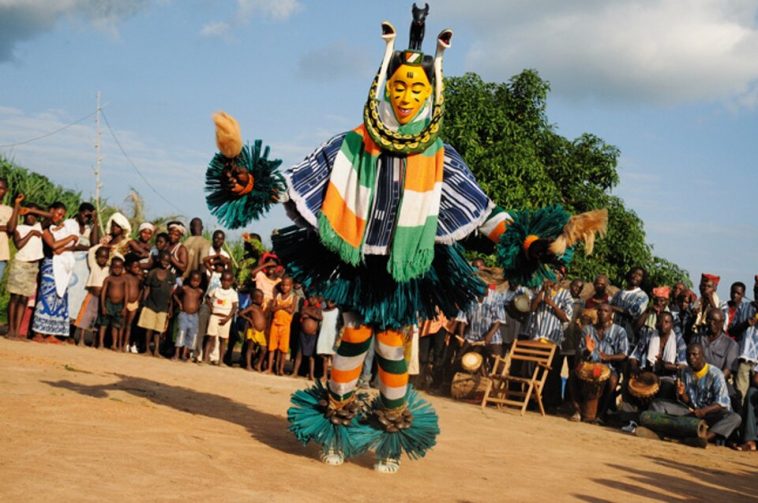Masquerading is an intrinsic part of African tradition. For some African communities, masquerades are symbolic to them as ancestors. For others, they are only entertainment mediums. While others are highly revered, only coming out in the public during ceremonies of high repute.
One clear thing is that these masquerades add colours, prestige and a large dose of excitement at public outings. The Zauoli mask and its accompanying energetic dance performance are one of such.
Originally inspired by the legend of LaLou Zaouli, a goddess for the Gouro ethnic group of Cote D’Ivoire, the mask is brightly coloured. Finely carved, it is an artistic representation of the feminine beauty of Zaouli. Although the Zaouli mask of the Zaouli masquerade is a symbolic representation of beauty, it is not worn by women. Rather, by men who have been initiated into the masquerade cult after series of traditional rites.
The masquerade is an intriguing spectacle to see. A lot of energy is involved in the public appearance of the masquerade in public. As it assembles craftsmen who carve and design the mask, artisans who make its cloak and the traditional musical ensemble that plays while it is performing.
Markedly, a fusion of elaborate artistic elegance, its upper body is covered in a loose-fitting cloth. On its wrist, sits loosely fitted raffia forming a concentric shape. While it dons on its legs, tightly fitted trousers and pods on its ankles to create rhythmic sounds while dancing.
It is brought to the performance centre cloaked. At the onset of the flutes, drums and other musical instruments, the masquerade bursts into a frenetic dance step in which its legs are swiftly in motion, leaving in its trail, patches of dust to the delight of spectators.
These dance steps performed by the masquerade is believed to be spiritual and inimitable by humans. Though restricted to initiates, the regular performance of this dance has seen its transmission across generations, recounting the legend of Zaouli through songs and earning it a place as one of the UNESCO cultural heritage.





GIPHY App Key not set. Please check settings